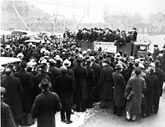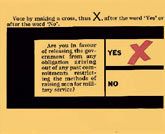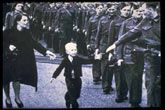Conscription
Louis S. St. Laurent National Historic Site
 Anti-Conscription demonstration, 1942
Anti-Conscription demonstration, 1942© National Archives of Canada / PA-107910
During the First World War, a majority of French-Canadians refused to take part in a conflict they considered strictly European. Conscription (obligatory enrolment of the population for military service), which was brought in by the Canadian government in 1917, aroused anger amongst the French Canadian population. In 1918, there was a riot in Quebec in which a number of people were killed or injured.
 Illustration of a Ballot
Illustration of a Ballot© Parks Canada
Twenty years later, with a new war threatening Europe, the question of military conscription was once more brought up in Canada. The Liberal government of Mackenzie King wished to avoid the emotional conflicts of 1917, and agreed repeatedly not to resort to obligatory conscription for overseas military service.
However, as of 1941, given the sluggish level of recruiting in Canada, a certain number of people began to urge conscription. These people came first from the Conservative Party, but were later supported by English Canadians as a whole. Faced with this reaction, Mackenzie King held a plebiscite asking Canadians to free the government from its previous commitment.
 Illustration of a Ballot
Illustration of a Ballot© Parks Canada
On April 27, 1942, 71% of Quebec citizens voted against the proposal. Elsewhere in Canada, the proposal was agreed to by a majority of 70%. In July of the same year, using this majority, the Government adopted Bill 80, which allowed conscription for overseas service when deemed necessary.
 Last march past by Canadian soldiers prior to embarcation
Last march past by Canadian soldiers prior to embarcation© National Archives of Canada / C-38723
In 1944, front-line losses decimated the army and it became imperative to provide replacements. King's government, after considerable hesitation, brought in conscription for overseas service. St-Laurent backed his leader. The Liberals relied on him to convince francophones of the need to take up arms.
St-Laurent's position was difficult and he was the target of much criticism. In Quebec, he was accused more particularly of involving his compatriots in a foreign war. On the other hand, the anglophones imperialists criticized his anti-imperialist convictions and accused him of making "over-nationalistic", "over-Canadian" pronouncements.
Sources:
Bélanger, Jacqueline et al, Louis-S. St-Laurent: Two Careers, One Destiny, Ottawa, Canadian Heritage, Parks Canada, c1995, 23 p.
Gaffen, Fred, "Wartime", Horizon Canada, Brampton, Ontario, Centre for the Study of Teaching Canada, Vol. 9, c1984-1987.
Granatstein, J. L, "Conscription - World War I", The Canadian Encyclopedia, Edmonton, Hurtig Publishers, Vol. 1, c1988.
Jones, Richard, "Conscription - World War II", The Canadian Encyclopedia, Edmonton, Hurtig Publishers, Vol. 1, c1988.
Quinn, Majella and Claude Marcil, Louis-S. St-Laurent, Jurist, Politician and Statesman, Ottawa, Minister of Supply and Services Canada, c1982, 47 p.
- Date modified :